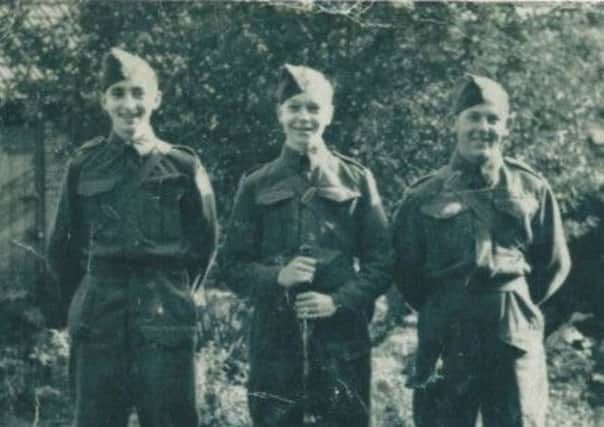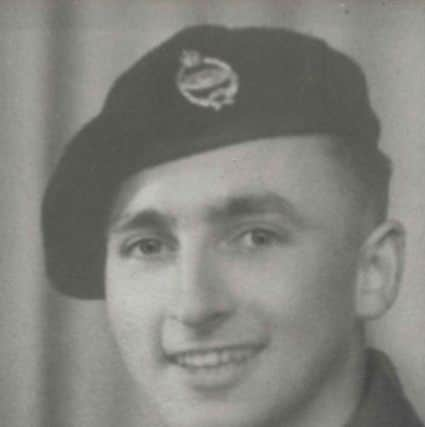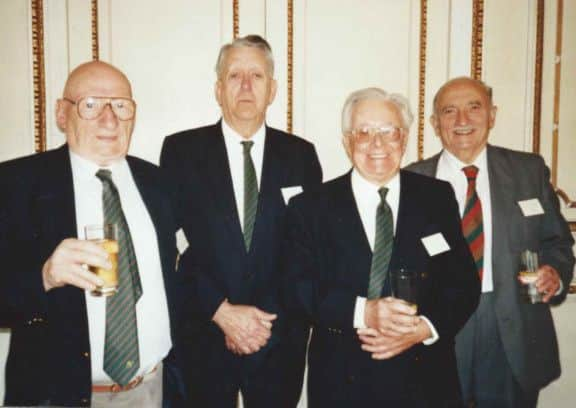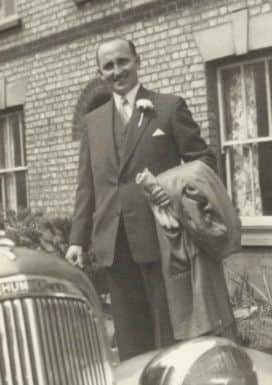The Deliverance Men


Denis served as a wireless operator and tank corporal in “A” Squadron of the 7th Royal Tank Regiment under the command of Major Dick Jocelyne, a former professional tea-taster who had lived in Shanghai. There were three tanks in each squadron and Denis’s was affectionately named Janet (the other two were called Jennifer and Jill).
In 1942 at the age of 17, Denis had joined Biggleswade’s Home Guard. He had originally wanted to be a fighter pilot but firing a Lewis gun for two years left his ear drums perforated so he wasn’t able to join the RAF. He came to believe it was a decision that probably saved his life.
Advertisement
Advertisement
After joining the army, Denis trained for months on the south coast and Nick thinks his father finally left Gosport on June 18, 1945, as part of the advance tank party following behind the infantry. It was 12 days after D-Day had taken place.


Along with a diary, wireless operator Ken Haylor filled in much of the background about “A” Squadron’s movements in an account he wrote in 1984 – movements which would have been so secret that even the men would not have known what was happening until ‘the eleventh hour’.
On the crossing, conditions at sea were rough and they were forced to travel through a lee of wreckage for three days.
When they eventually landed in Normandy on June 23, somewhere between Juno and Gold Beach, they came face to face with Number 12 Panzer Division – the elite of the German tanks.
Advertisement
Advertisement
They were subsequently involved in the biggest tank battle of the war at Hill 112. Denis recalled seeing American Sherman tanks being blown apart like “fireballs”.


However, although the German Tiger tanks outclassed them in armament, they had a weak point at the back and it was said the German troops dreaded the British Churchill tanks for their speed and cross country performance.
According to Ken’s account, Denis and the rest of the squadrons had to live under almost constant fire during this time, eating and sleeping very little.
By August 18, the battles were over in Normandy and Denis, having been promoted to corporal, moved up to Le Havre with his men. He was just 21.
Advertisement
Advertisement
Len Woollcott, a gunner, was able to relate to Nick how his father earned the Military Medal. It was while their tanks were harboured (forming a laager), near Deventer in Holland, when German tanks overran them and took the squadron’s field telephone. Apparently, Denis was so incensed at this that he crossed enemy lines to successfully retrieve it. And it wasn’t the only time that Denis showed his mettle in the face of conflict. While they were at Deventer, one of Janet’s tracks came off and they ended up marooned on a railway embankment under enemy fire. Undeterred, Denis climbed up to the tank to aid his men and boost their morale saying: “I thought you needed some help up here as you looked a bit lonely.”


Denis’s brother Alan, who was six years younger, can recall seeing him on the Movietone News. He says: “I went to the Royal Cinema and they were reporting on the war. Suddenly there was Denis waving from the battalion of a tank. It turned out they had given a lift to the press after D-Day.”
Alan continues: “I left school at 14 and remember seeing him off on the train and our dad saying ‘don’t be surprised if that is the last you see of him’.”
Somehow, Denis managed to survive, although there were several narrow escapes.
Advertisement
Advertisement
The soldiers’ bedding was kept around the inside of the top of the tank turret. One day, Denis was up in the turret and bent down just as a shell took part of the top of the turret off, exactly where his head had been a second or two before.


Although Denis was lucky, managing to cheat death several times while liberating enemy-owned territory, two of his friends and a cousin never returned.
One was his best friend Maurice Hopkins who lived in St John’s Street and had attended Rose Lane School and been in the Biggleswade Home Guard with Denis (Maurice appeared in one of last week’s photographs).
Sadly, he was killed in a Sherman tank and his name is listed on Biggleswade’s war memorial.
Advertisement
Advertisement
Another friend, Alan Jolly died on a night reconnaissance mission when he stepped on a landmine.
Denis was due to be with him that night but plans changed at the last minute and so once again he had a lucky escape.
Denis’s cousin Reg Lincoln was slain in Singapore when his ship was sunk.
After nearly a year of pushing the Nazis back across Europe, Denis was one of thousands of Allied men who finally reached enemy homeland.
Advertisement
Advertisement
But he recalled that those last days were perhaps some of the hardest, saying: “After so long we became a bit edgy when it was nearly the end of the fighting and we were still alive.”
During this latter part of the war, the 7th Royal Tank Regiment’s Churchill tanks were adapted with Crocodile flame throwers making them a formidable opponent in enemy territory, destroying everything in their path.
The flame-throwing gun was fitted in the co-driver’s compartment in place of the BESA machine gun, and was fed under pressure by fuel lines running from a heavily armoured trailer attached to the back of the tank.
They were dubbed ‘crocodiles’ after the colour of the armour and the appearance of the articulated units.
Advertisement
Advertisement
The recent film, ‘Fury’ starring Brad Pitt is about the American Sherman tank involvement in this latter part of the war and gives a good idea of the conditions that Denis and his men would have had to endure.
Denis’s “A” Squadron was one of the first troops to arrive at Belsen concentration camp which he described as a “horror camp”.
There, they had the gruesome task of taking care of the piles of dead bodies which must have come as a huge shock to the men.
Denis heard about the German surrender through the BBC on his tank radio with “thankfulness and relief”.
Advertisement
Advertisement
He said: “That evening because of where we were, we were a bit limited with what we could celebrate but we certainly did our best to...
“My tank, Janet, had been my home, mainly since Normandy and it seemed we had now completed this part of our own travels.”
Finally, they managed to reach Hitler’s bunker, which they found littered with German Luger pistols.
Denis’s son Nick visited the garden above the bunker a few years ago on a Military History Tours trip to see the ‘Great Escape’ PoW camp in Sagan.
Advertisement
Advertisement
Sitting above the bunker where his dad had been in such a significant way in 1945 was very moving to Nick and gave him a strong sense of deja vu.
Throughout the time Denis served, he was promoted to the rank of sergeant, and as well as being presented with his medal by General Montgomery, he also had a local presentation in St George’s Hall by Rex Huckle.
Denis’s citation read that he had ‘achieved results which were outstanding’, and continued: ‘Mr Sale’s job involved the laying and maintenance of vital telephone lines as the Allies pushed forward and was usually done in pitch dark – with the constant threat of being spotted by enemy patrols.
For sheer slogging hard work this man is unexcelled by anyone in the squadron, his sense of duty predominating all other action...’
Advertisement
Advertisement
After the war Denis became a stalwart of the local community serving on Biggleswade and Potton Town Councils and actively participating in local sports teams. He was known and respected locally.
After retiring in 1997, he developed a degenerative lung condition which, with a certain irony, is believed was contracted near Lille, France during his army service.
The 7th Royal Tank Regiment’s motto ‘through the mud and the blood to the green fields beyond’ is inscribed on Denis’s memorial and it seems a fitting tribute to a brave soldier who his family describe as having always been an “unassuming” man.